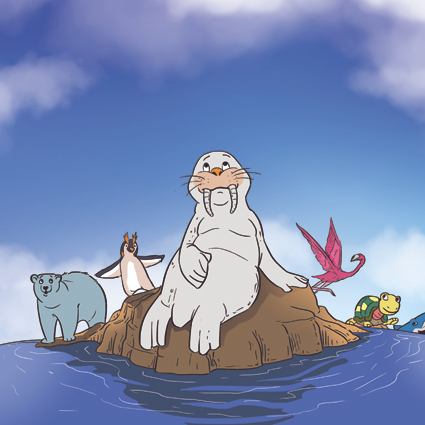Walry The Woeful Walrus
Sometimes bad things happen. Sometimes rescue never comes. Sometimes circumstances don't meet expectations. Sometimes we can but change from within, and grow. Specifically, this story deals with loss and abandonment, and how an internal change of perspective can make all the difference.
.jpg)
"When I look at loss and abandonment, I think of silence, aloneness, stillness, loss of voice, and the accompanying isolation."

Somehow, he finds an inner peace that draws others in. How? As my two-year-old grandson put it, "Walry learned to make himself happy."

What was I thinking?
If a tree falls in a forest and no one is there to hear it, does it make a sound? Of course, we may argue that the tree emits vibrations, which can be interpreted as "sound," but if no one is there to "interpret" the vibrations, does it make a sound? Has the forest changed any as the result? Is the forest still a forest, despite the change of one fallen tree? Is there any impact
the world whatsoever?
What was I thinking when I wrote Walry, the saddest and loneliest of all the books I have written thus far? I struggled with whether such a sad story was appropriate for all ages, but I finally realized that all experience sadness and grief. Why would it be inappropriate to talk about some emotions while only focusing on others?
What was I thinking when Walry arrived on the pages with a speech impediment? Obviously, it would be difficult to enunciate correct diction with two tusks in one's mouth, but beyond that, at the risk of marginalization of such a disability, I allowed him to utter his innermost feelings, and this is how he arrived; Imperfect, flawed, and viscerally real.
Sometimes I wonder which is more impactual: form or content? It seems as though "how" things are said far outweigh "what" is said.
If a child utters a thought, and no one is there to listen, has the child made a sound? Has the child changed any as the result? Is the child still the same despite the lack of confirmation? Will the child grow up to be someone able to lead and influence the world? Will there be any impact whatsoever?
When I look at loss and abandonment, I think of silence, aloneness, stillness, loss of voice, and the accompanying isolation. Loss, to me, brings with it a feeling of unfinished business. It holds within it things left unsaid. It shrouds all in a miasma of disconnection and isolation. Of course Walry speaks with difficulty. He is lost. He has been abandoned. He has no closure.
He is alone ...
Walry experiences the loss of his family and home at a very early age. He experiences isolation and separation, hopelessness, and disillusionment.
He is alone...
No inspirational music spurs him on to swim across oceans to heroically become reunited with his family. No fairy godmother or other outside help rescues him. Nothing that he or anyone else can do will ever bring his family back.
He is alone...
Others try to help him. They bring him food and teach him how to gather food, but he finds no matter how much the do-gooders do, they live in different worlds, speak different languages, and he simply can not follow.
He is still alone...
Mark has done an amazing job of portraying the stillness, isolation, and grief that comes with loss. Early on in the book, Walry is extremely small. Such a tiny little speck of a being amidst the enormity of the universe. As the story progresses, and Walry grows, he becomes more solid, more substantial, and more centralized on each page until finally, he fills the entire page with his serenity and peace. Once he finds his inner peace, others flock to him just to be near.
Is he still alone? Yes... but he has found peace in being alone...
How does he find serenity? What occurs within the story to resolve the problem? There's not much action in this story. Nothing really happens on the outside in this story. Essentially, Walry falls off the boat, whines and cries and blubbers for a while, then sits on a rock the rest of the book. Yet somehow, all the "action" occurs within. Somehow, he finds an inner peace that draws others in.
How?
As my two-year-old grandson put it, "Walry learned to make himself happy."
-01.png)